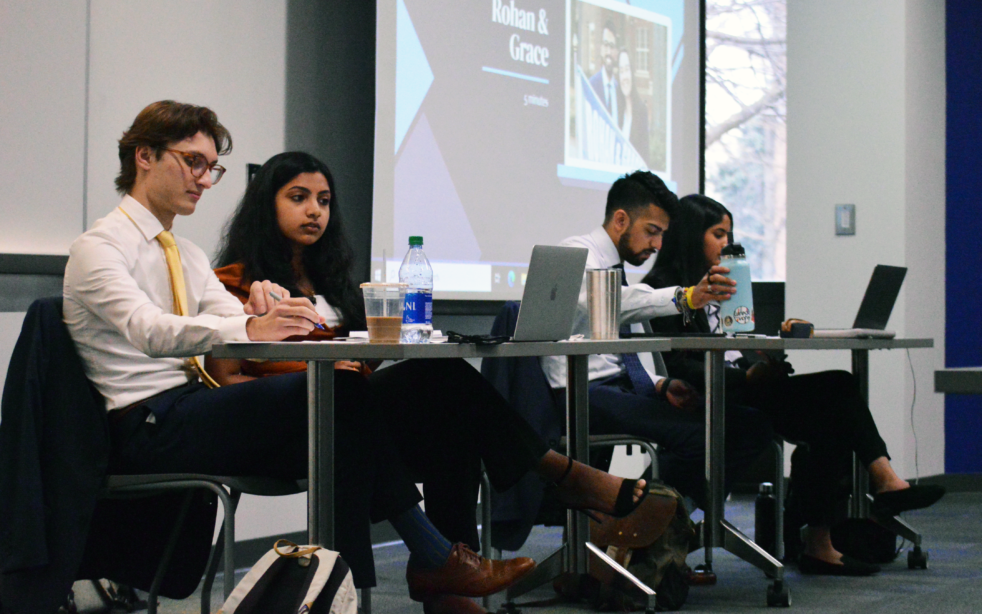On Tuesday, March 9, the Technique hosted the annual undergraduate Student Government Association (SGA) presidential debate. The event went hybrid this year, with many students, including one of the vice president candidates, tuning in virtually to hear from the two teams’ platforms.
This year there are two teams running for undergraduate SGA president and vice president. The first team is comprised of presidential candidate Rohan Sohani, third-year AE, and his vice presidential candidate running mate Grace Swift, third-year EIA. The second team included presidential candidate Srija Somaka, third-year ECON and Granger West, third-year PUBP and INTA double major.
The hour-long debate kicked off with each team giving five minute opening statements that provided an overview of their respective platforms. Sohani and Swift were in an interesting situation, with Swift tuning in virtually from Tech’s Lorraine campus located in Metz, France. As a result, it was decided that she would do the entirety of the opening statements and allow Sohani to finish the rest of the debate without her.
Swift spoke to their experience, explaining that she and Sohani had a combined six years of SGA experience and elaborated on how they would use that prior knowledge and involvement to help utilize SGA’s resources to their fullest. Swift elaborated on how Sohani was involved in a multitude of student task forces, while she herself has helped oversee many events and initiatives throughout her time at Tech, including the successful Midtown free fridge project.
Swift also claimed that SGA presidents had, in past years, only achieved 18% of their campaign promises while in office.
While she didn’t lay any blame on past candidates, she did mention that many projects can take longer than a year, leading to many being transferred over to incoming administrations and often forgotten about.
Swift promised to regularly listen to and help multicultural and underrepresented communities, and work with them to advocate, “at a much higher and more productive level” while putting student opinions and desires above any other concern.
Following Swift’s opening statements, she handed the reins over to Somaka and West, who then proceeded to give their opening statements.
Somaka claimed that they did not have any plans to run for office until two weeks before the election, but ended up deciding to because of issues they have observed with the structure of SGA. They claimed that reforming the structure of SGA was the key to helping the organization help the student body more effectively.
The team pointed to their platform, “It’s time for R.E.A.L change,” as being the way they would accomplish this.
Their campaign’s acronym stands for their platform’s focus areas which include: “Reforming SGA to work for you,” “Empowering all communities,” “Advocating for better mental health and wellbeing” and “Looking after campus infrastructure and sustainability.”
After opening statements, the debate moved into the more traditional questions phase.
Here, both sides were asked the same question and allowed three minutes to respond.
These questions included talking about the main issues students face today, assessing the parts of their platform that can realistically be completed within their first 100 days in office, and how they will work to include diversity, equity and inclusion in their governance structures if they were to take office.
Following this, the two candidate teams moved into the targeted question round. This round was structured differently than the group question round, with each team receiving a question tailored specifically to their campaign and its promises.
Somaka and West were asked the first question about why they would want to run an organization that is “disorganized, inefficient, overly secretive, and impaired by organizational politics,” which were words their campaign’s social media used to describe the current structure of SGA.
In response to this, Somaka pointed to structural problems being the cause of this, and promised to fix them so that SGA would no longer be plagued by such problems anymore. Sohani was then asked a question about how he got the data to support his claim that only 18% of promises from SGA presidential candidates had been kept, and how he would be different from them if he were to be elected.
Sohani pointed to many of the goals being lofty, and how he would ensure he kept his ideas realistic and grounded in things he could accomplish with help from the student body. However, before he answered this question, he took time to address Somaka’s previous answer regarding the issues within SGA, stating that he had not received more than one email from her while she was serving as the transfer student representative in the Undergraduate House of Representatives (UHR) and accused her of being hypocritical for condemning SGA for not reaching out to students effectively despite not doing so herself in her SGA position. West asked for time to defend themselves after this, which the moderator granted, and Somaka went on to accept this call out, but also pointed to the lack of material and initiative that UHR was allowed to take on account of the poor structure of SGA. Following this, the debate moved on to audience questions until finally reaching the time to make closing statements at the top of the hour.
Both campaigns were able to effectively present their arguments to the audience, providing an opportunity for the student body to learn more about the candidates and make an informed decision about who their next student body president will be.
Voting for the undergraduate SGA elections opens on March 14. Polls close on March 18 at 5:00 p.m. and undergraduate students can visit elections.gatech.edu to cast their vote.
